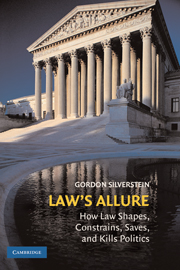Book contents
- Frontmatter
- Contents
- Acknowledgments
- LAW'S ALLURE
- Introduction: Law's Allure: The Juridification of American Politics and Public Policy
- PART I LAW'S ALLURE: WHY, WHY NOW, AND WHY IT MATTERS
- PART II LAW'S ALLURE: PATTERNS, PROCESS, AND CAUTIONARY TALES
- 4 Poverty and Abortion: The Risks and Rewards of a Judicial Strategy
- 5 Environmental Regulation: A Constructive Pattern
- 6 Campaign Finance: A Deconstructive Pattern
- 7 The Separation of Powers: When the Court Says Yes – and No
- 8 War Powers and Precedent: When the Court Is Reluctant to Intervene
- PART III LAW'S ALLURE: COSTS AND CONSEQUENCES
- Conclusion: The Promise and Peril of Law's Allure
- Bibliography
- Index
- References
6 - Campaign Finance: A Deconstructive Pattern
Published online by Cambridge University Press: 05 June 2012
- Frontmatter
- Contents
- Acknowledgments
- LAW'S ALLURE
- Introduction: Law's Allure: The Juridification of American Politics and Public Policy
- PART I LAW'S ALLURE: WHY, WHY NOW, AND WHY IT MATTERS
- PART II LAW'S ALLURE: PATTERNS, PROCESS, AND CAUTIONARY TALES
- 4 Poverty and Abortion: The Risks and Rewards of a Judicial Strategy
- 5 Environmental Regulation: A Constructive Pattern
- 6 Campaign Finance: A Deconstructive Pattern
- 7 The Separation of Powers: When the Court Says Yes – and No
- 8 War Powers and Precedent: When the Court Is Reluctant to Intervene
- PART III LAW'S ALLURE: COSTS AND CONSEQUENCES
- Conclusion: The Promise and Peril of Law's Allure
- Bibliography
- Index
- References
Summary
Courts and congress, working together with each other – each building on the other, and both heading roughly in the same direction – can engage in constructive juridification, pushing policy in directions favored by politicians and policy entrepreneurs alike. But when, far from building and fortifying each other's work, judges and legislators intentionally, inadvertently, or unavoidably work at cross-purposes; when the courts pull out bricks laid by Congress or replace them with different bricks, in different patterns; when one side tears down part of the foundation laid by the other, rebuilding on top of what is left, limiting, construing, and misconstruing the actions of the other; the result actually may generate new problems as bad or worse than those that inspired the move to juridify in the first place. Consider campaign finance reform as such an example of what might be called deconstructive juridification.
Few would argue that a vibrant democracy can long endure rampant political corruption. Even the mere appearance of corruption can have a corrosive effect, suppressing voter turnout and undermining political claims to legitimacy and authority. This lesson was raw and fresh when Congress set out to debate amendments to the Federal Elections Campaign Act in the shadow of the Watergate scandal in 1974. The legislators produced an extremely complex set of rules, regulations, and bureaucratic and criminal enforcement mechanisms designed to generate transparency and to limit the importance of money – and, therefore, the temptation and even the appearance of political corruption.
- Type
- Chapter
- Information
- Law's AllureHow Law Shapes, Constrains, Saves, and Kills Politics, pp. 152 - 174Publisher: Cambridge University PressPrint publication year: 2009



